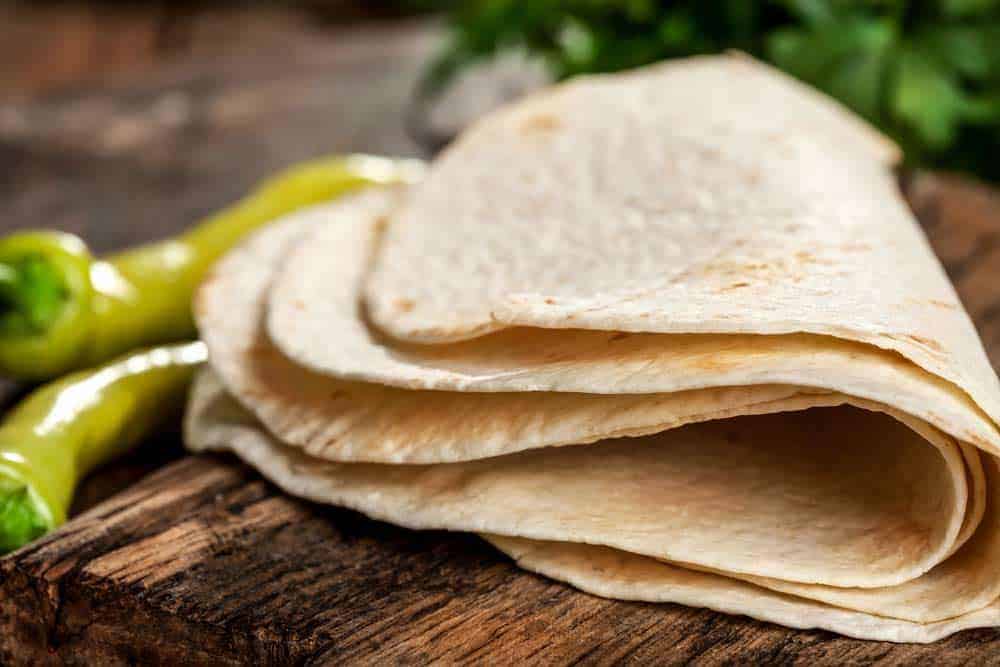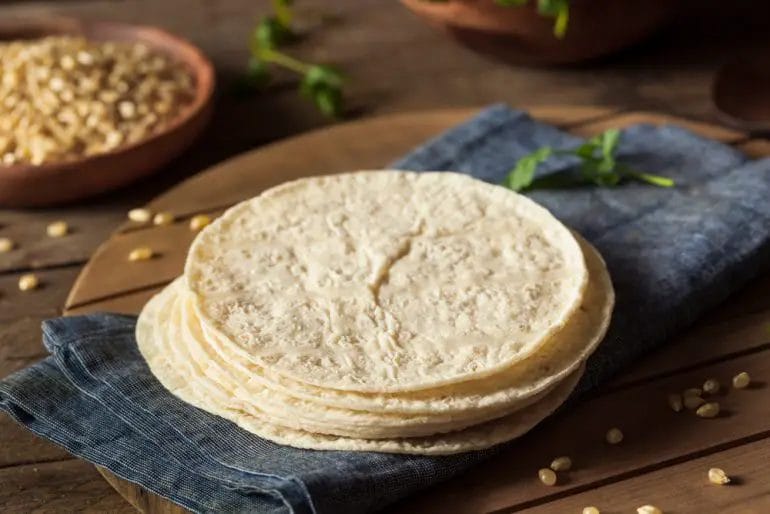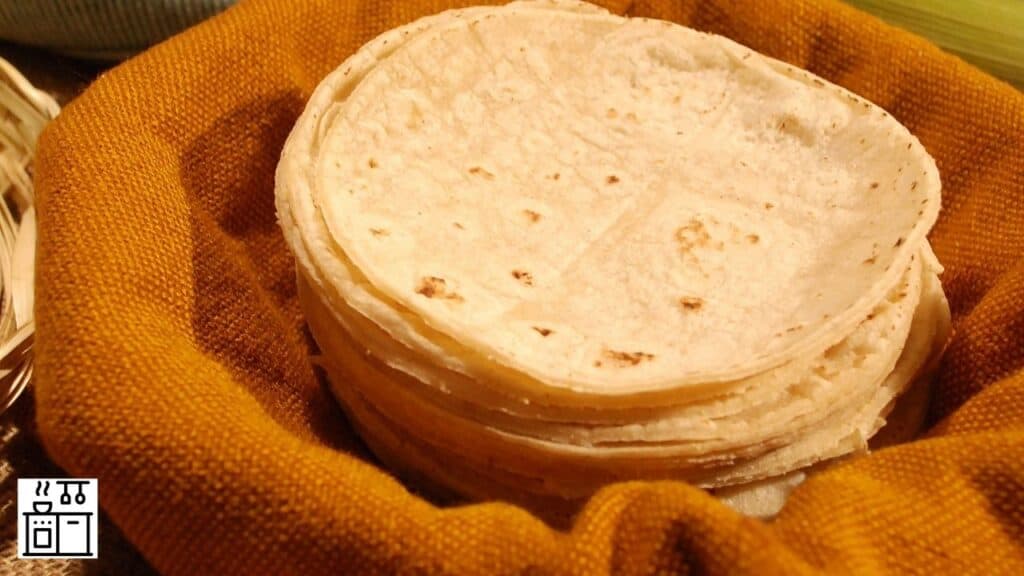Yes, tortillas can go bad if not stored properly. Like any food product, they have a limited shelf life.
Exposure to air and moisture can cause them to become stale, moldy, or develop an off flavor. It’s important to check the expiration date and store them in a cool, dry place to maximize their freshness.
If you notice any signs of spoilage such as discoloration, foul odor, or a slimy texture, it’s best to discard them to avoid potential foodborne illnesses.

Shelf Life of Tortillas: Understanding Expiration Dates
Like any food product, tortillas have a limited shelf life, and understanding expiration dates is essential to ensure their freshness and safety.
Homemade tortillas will typically last about a week if refrigerated and a couple of days at room temperature. However, store-bought tortillas can last one week past the printed expired date at room temperature while maintaining their quality. If you refrigerate them, they will be okay to be eaten even after 2 weeks of the printed expired date.
The expiration date is typically printed on the packaging of tortillas and can be in the format of “best before,” “use by,” or “sell by.”
Factors affecting the shelf life of tortillas
The shelf life of tortillas can be influenced by various factors. Understanding these factors can help you determine whether your tortillas are still safe to consume:

- Moisture: Tortillas are prone to moisture absorption, which can lead to mold growth. Storing them in a dry environment or using airtight packaging can help prolong their shelf life.
- Temperature: High temperatures can accelerate the spoilage process of both corn and flour tortillas. It is recommended to store them in a cool and dry place.
- Contamination: Being a perishable food item, tortillas are susceptible to bacterial contamination. It is essential to handle them with clean hands and ensure proper storage to prevent any bacterial growth.
- Use of Preservative: Store-bought tortillas contain preservatives so that they remain immune to bacteria or fungus growth for a certain period.

Signs of Spoiled Tortillas: How to Spot Them
In this section, we will explore the signs of spoiled tortillas and provide tips on how to spot them.
1. Mold or Foul Odor:
The first and most obvious sign of spoiled tortillas is the presence of mold. Mold can appear as fuzzy green or white patches on the tortilla surface. If you notice any mold growth, it is best to discard the entire batch of tortillas as eating moldy food can lead to food poisoning or allergic reactions.
In addition to mold, spoiled tortillas may emit a foul odor. If your tortillas have a strong sour or rotten smell, it is a clear indication that they have gone bad and should not be consumed.
2. Texture Changes:
Fresh tortillas are soft, pliable, and slightly moist. However, when they start to spoil, their texture changes noticeably. If you find that your tortillas have become dry, brittle, or stiff, it is a sign that they have passed their prime and are no longer safe to eat.
Another texture change to look out for is excessive stickiness. Spoiled tortillas may feel excessively sticky or gooey to the touch, indicating microbial growth or high moisture content. In such cases, it is advisable to discard the tortillas to avoid any potential health risks.
3. Color Alterations:
Fresh tortillas typically have a yellowish or golden color. However, as they spoil, their color may change or appear off. If you notice any discoloration, such as spots of green, blue, or black, it is a clear indication that the tortillas have gone bad and should not be consumed.
4. Taste Test:
If you suspect that your tortillas may be spoiled but are unsure, you can perform a simple taste test. Take a small bite of the tortilla and pay attention to the flavor. Spoiled tortillas may have a strong sour or unpleasant taste.
If the taste seems off or unpleasant, it is best to discard the tortillas to avoid any potential foodborne illnesses.
Proper Storage Tips for Extending the Life of Tortillas
In this section, we will discuss some essential tips to help you extend the life of your tortillas.
1. Keep them in airtight containers
One of the most important steps in preserving tortillas is to store them in airtight containers.
This prevents air and moisture from reaching the tortillas, maintaining their texture and preventing them from becoming stale. Plastic storage bags or containers with tight-fitting lids are ideal for this purpose.
2. Store them in the refrigerator
For longer shelf life, consider storing your tortillas in the refrigerator. The cool temperature helps slow down the growth of bacteria and mold, keeping the tortillas fresh for a longer duration.
Place the airtight container of tortillas in the refrigerator and consume them within a week for optimum taste and quality.
3. Freeze for extended storage
If you have a large quantity of tortillas that you want to preserve for an extended period, freezing is a great option.
Wrap the tortillas tightly in plastic wrap or place them in freezer bags to prevent freezer burn. Frozen tortillas can typically last for up to six months without compromising their taste and texture.
4. Separate tortillas with parchment paper
When storing multiple tortillas together, it’s crucial to separate them to prevent sticking.
Place a piece of parchment paper or wax paper between each tortilla to keep them from adhering to one another. This makes it easier to retrieve individual tortillas without damaging them.
5. Reheat tortillas properly
If your tortillas have been refrigerated or frozen, it’s essential to reheat them properly to ensure their taste and texture remain intact.
You can heat them on a hot skillet for a few seconds on each side until they become warm and pliable. Alternatively, you can wrap them in a damp paper towel and microwave them for a short duration.
6. Use a tortilla warmer
To keep your tortillas warm and moist during a meal, consider investing in a tortilla warmer.
These insulated containers help retain heat and moisture, preventing the tortillas from drying out. Simply place the tortillas inside the warmer and cover them until you’re ready to serve.
7. Avoid exposure to heat and sunlight
Exposure to heat and sunlight can cause tortillas to become dry and brittle. It’s essential to store them in a cool, dry place away from direct sunlight, stoves, or ovens.
Heat and sunlight can accelerate the staling process and affect the taste and texture of the tortillas.
8. Check for signs of spoilage
Before using stored tortillas, always check for signs of spoilage. Look for mold, off-putting odors, or discoloration. If you notice any of these signs, discard the tortillas immediately, as consuming spoiled tortillas can lead to foodborne illness.
By following these proper storage tips, you can extend the shelf life of your tortillas and enjoy their fresh, delicious taste in your favorite recipes.
Reviving Stale Tortillas: Quick and Easy Tips
There’s nothing worse than getting ready to enjoy some delicious tacos or enchiladas, only to realize that your tortillas have gone stale. But fear not! With a few simple tips and tricks, you can easily revive those stale tortillas and enjoy your meal without any compromise in taste or texture.
1. Damp Paper Towel Method
If your tortillas have just started to stale and are still relatively soft, the damp paper towel method is a quick and effective solution.
Simply place your tortillas between two damp paper towels and microwave them for about 30 seconds. The steam created by the damp towels will help moisten the tortillas and make them pliable again.
2. Stovetop Method
If you prefer to use the stovetop instead of the microwave, you can also revive your tortillas by gently heating them in a dry skillet or griddle.
Place the tortillas on the heated surface for about 30 seconds on each side, or until they become soft and pliable. Be careful not to overcook them, as they can become crispy instead of soft.
3. Steam Method
If you don’t have a microwave or stovetop available, you can use the steam method to revive your tortillas.
Fill a pot with about an inch of water and bring it to a simmer. Place a steamer basket over the pot and arrange your tortillas in a single layer. Cover the pot and let the tortillas steam for about 1-2 minutes. The steam will moisten the tortillas and make them soft again.
4. Oven Method
If you have a larger quantity of tortillas that need reviving, you can use the oven method. Preheat your oven to 350°F (180°C) and wrap your stack of tortillas in aluminum foil.
Place the foil-wrapped tortillas in the oven for about 10 minutes, or until they become soft and pliable. Be careful when removing the foil, as the steam trapped inside can be hot.
5. Use Them in a Different Recipe
If your tortillas are too stale and cannot be revived to their original texture, don’t throw them away just yet.
You can still utilize them in other delicious recipes. Stale tortillas are perfect for making tortilla chips, tostadas, or even breadcrumbs for coating meats or vegetables.
6. Proper Storage and Prevention
To prevent your tortillas from going stale in the first place, it’s important to store them properly. Keep your tortillas in an airtight container or a resealable plastic bag. You can also wrap them individually in plastic wrap before storing them. Storing tortillas in the refrigerator can help prolong their freshness and prevent them from becoming stale too quickly.
In summary, reviving stale corn and flour tortillas is a quick and easy process that can save your meal from being ruined. Whether you choose to use the damp paper towel method, stovetop method, steam method, oven method, or repurpose them in another recipe, there’s no need to waste those tortillas. Just a little bit of effort can bring them back to life and ensure that your next Mexican feast is as delicious as ever.
Safe Consumption of Tortillas: Food Safety Guidelines to Follow
When it comes to enjoying delicious and nutritious tortillas, it’s important to prioritize food safety. By following the proper guidelines, you can ensure that your tortillas are safe to consume. In this section, we will discuss some essential food safety guidelines to keep in mind.
1. Purchase from Reputable Sources
Start by purchasing your tortillas from reputable sources. Look for established brands or trusted local vendors who prioritize food safety.
Check for the expiry date and ensure that the packaging is intact and free from any damage. This will help minimize the risk of contamination.
2. Proper Storage
Once you bring your tortillas home, store them properly to maintain their freshness and safety. It is recommended to keep them in a cool and dry place, away from direct sunlight or high humidity. Seal the package tightly after each use to prevent exposure to air and potential contamination.
3. Check for Spoilage
Before consuming tortillas, it is essential to check for any signs of spoilage. Discard tortillas that have mold growth, unusual odor, or a slimy texture.
These are indicators of bacterial or fungal contamination and can pose health risks if consumed.
4. Proper Handling
When handling tortillas, proper hygiene practices are crucial. Always wash your hands thoroughly with soap and water before and after handling tortillas.
This helps prevent the transfer of bacteria or other pathogens to the food. Additionally, use clean utensils and cutting boards when preparing or serving tortillas.
5. Cooking and Reheating
Tortillas can be enjoyed both raw and cooked. If you prefer to cook or heat your tortillas, ensure they reach a safe internal temperature.
Cooking the tortillas at a temperature of 165°F (74°C) helps kill any potential bacteria or pathogens that may be present. Avoid consuming raw tortillas if you have a compromised immune system or are pregnant.
6. Avoid Cross-Contamination
To prevent cross-contamination, it is important to keep your tortillas separate from raw meat, poultry, seafood, and other potential sources of contamination.
Use different cutting boards and utensils for handling raw ingredients and tortillas. This practice minimizes the risk of foodborne illnesses.
7. Refrigeration
If you have leftover tortillas, refrigerate them promptly. Place them in an airtight container or resealable bag and store them in the refrigerator at a temperature below 40°F (4°C). Consume the leftovers within a few days to ensure their quality and safety.
8. Allergen Awareness
Be mindful of potential allergens present in corn and flour tortillas. Some individuals may have sensitivities or allergies to ingredients like gluten, corn, or other additives.
Always read the ingredient list carefully, especially if you have dietary restrictions or food allergies.
In summary, ensuring the safe consumption of tortillas involves purchasing from reputable sources, proper storage, checking for spoilage, practicing good hygiene, cooking or reheating adequately, avoiding cross-contamination, refrigerating leftovers, and being aware of potential allergens. By following these guidelines, you can enjoy your tortillas with confidence, knowing that they are safe and delicious.
Can corn tortillas go bad?
Yes, corn tortillas can go bad. They have a limited shelf life and can spoil if not stored properly. It is important to check for signs of mold, discoloration, or an off smell before consuming them.
Conclusion:
Both corn and flour tortillas can indeed go bad over time. Like any food item, they are subject to spoilage and deterioration. Factors such as exposure to air, moisture, and heat can accelerate the process. It is essential to store tortillas properly to maintain their quality and prolong their shelf life.
When storing tortillas, ensure they are tightly sealed in an airtight container or wrapped in plastic wrap to prevent air and moisture from entering.
Additionally, storing them in a cool and dry place can help slow down the spoiling process. Always check for any signs of mold, discoloration, or an off smell before consuming tortillas.
To ensure that you enjoy fresh and delicious tortillas, it is advisable to use them within a reasonable time frame, typically within a week or as stated on the packaging.
By practicing proper storage and being mindful of their shelf life, you can savor the taste of tortillas without any concerns.
